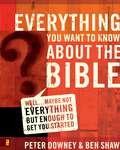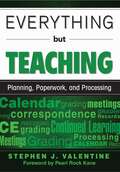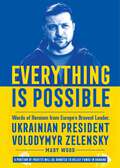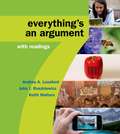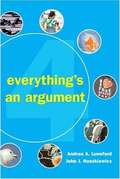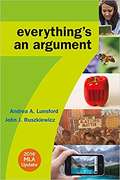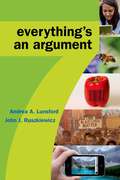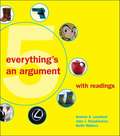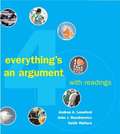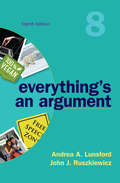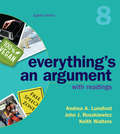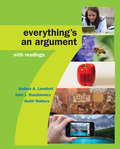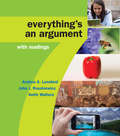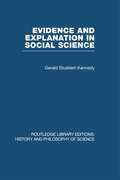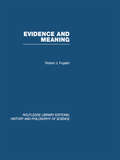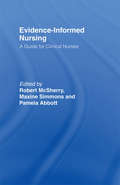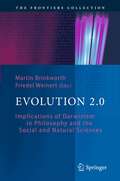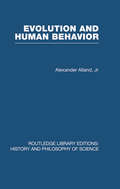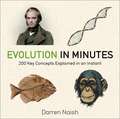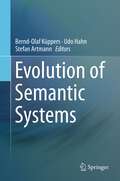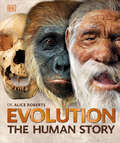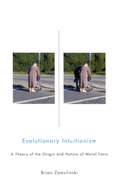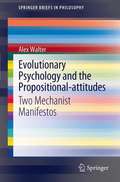- Table View
- List View
Everything You Want to Know about the Bible: Well…Maybe Not Everything but Enough to Get You Started
by Ben James Shaw Peter Douglas DowneyIt’s the bestselling book ever. It’s been translated into more than 2,000 languages. It’s changed people’s lives around the world. No, it’s not Thin Thighs in 30 Days . . . it’s the Bible! Yet the Bible remains about as well-understood to many people as your typical software license agreement—and about as exciting. That’s too bad, because the Bible is exciting, and it doesn’t have to be a mystery. Whether you’re new to the Bible and think the book of Job is a guide to finding the perfect career, or your rusty Bible knowledge needs a spit-and-polish, or you just want a fresh look at the book you’ve read so many times, this is the book for you. No dry theological treatise, it’s written in an engaging, humorous style you will enjoy. In short, readable chapters, the authors first answer some basic questions: Who wrote the Bible? Is it accurate? How do you find your way around it? And how did Noah fit all those animals into the ark anyway? (Well, maybe not that, but there’s still plenty of trivia in there.) Then they take you on a guided tour from Genesis to Revelation, summarizing important people, events, and themes. You’ll get a good foundation for understanding and an excitement for reading this most important of books, the Bible. “The title says it all! It’s an inspiring trailer for the Best Book in the World. Read it front to back or just dip in—either way it does the biz.” —Rob Lacey, author of the word on the street, actor and broadcaster
Everything but Teaching: Planning, Paperwork, and Processing
by Stephen J. ValentineLearn the 7 Imperatives for managing the "other" work of a teacher!Every teacher knows that what happens before and after class is as important as what happens during class. This accessible resource gives all teachers indispensable tips for managing professional priorities outside the classroom and saving energy for the most essential part of their work: teaching students.Real-life vignettes, planning sheets, and other templates, illustrate how to master the multitasking demands of the teaching life, including: Planning time wisely Tailoring grading practices to provide clear feedback Holding productive meetings with students, parents, or colleagues Keeping and using records effectively Corresponding with grace, tact, and detail Processing information and refining procedures Embracing new professional learning opportunitiesWithout good planning and organization, even the best teachers may not be able to effectively reach their students, and the classroom can suffer. Using this invaluable guide, teachers can develop their professional skills. First year and veteran teachers alike can find new ideas for the business of running a class so that they can focus on the most important thing: teaching.
Everything is Possible: Words of Heroism from Europe's Bravest Leader, Ukrainian President Volodymyr Zelensky
by Mary Wood*A portion of profits will be donated to relief funds in Ukraine*"When you attack us, you will see our faces, not our backs, but our faces." —Volodymyr Zelensky, hours before Russian Autocrat Vladmir Putin invaded Ukraine&“Glory to Ukraine&” isn&’t a greeting, it&’s a calling. Ukrainian President Volodymyr Zelensky is the unexpected leader of a generation, one whose unwavering strength rallied everyday citizens to defend their homes, take to the streets, and fight for their independence. Everything is Possible is a collection of President Zelensky&’s most powerful words of bravery, demand for grit, and declarations for peace.On the pages of this book, you&’ll find the unshakable conviction of a leader who stands up not just for his people, but for the future of all people throughout the world. President Zelensky&’s fierce sense of duty and steadfast faith in a better tomorrow are reminders that Ukraine&’s values are human values. Find humility, strength, and compassion in the guiding force whose full-throated, full-hearted leadership shook the world awake. Glory to the heroes. Read through nearly 150 moving quotes on courage, unity, and freedomFind inspiration in the Ukrainian president&’s unrelenting force, determination, and decencyBe encouraged by the humanity and resolve that can be found in the darkest of times
Everything's An Argument with Readings
by Andrea A. Lunsford John J. Ruszkiewicz Keith WaltersPairing a best-selling argument text with a thematic reader, Everything's an Argument with Readings teaches students to analyze the arguments that surround them every day and to create their own. The book starts with proven instructional content by composition luminaries Andrea Lunsford and John Ruszkiewicz, covering five core types of arguments. Revised based on feedback from its large and devoted community of users, the seventh edition offers a new chapter on multimedia argument and more than 35 readings across perspectives and genres, from academic essays and newspaper editorials to tweets and infographics. Combine the text with LaunchPad for Everything's an Argument with Readings for even more engaging content and new ways to get the most out of your course. Access unique, book-specific materials in a fully customizable online course space; then adapt, assign, and integrate our resources with yours. This LaunchPad includes: Interactive exercises and tutorials for reading, writing, and research LearningCurve adaptive, game-like practice that helps students focus on the topics where they need the most help, such as fallacies, claims, evidence, and other key elements of argument Reading comprehension quizzes Everything's an Argument is also available in a brief version without the reader.
Everything's an Argument
by Andrea A. Lunsford John J. RuszkiewiczEverything's an Argument's unique, student-centered approach to teaching argument has made it the best-selling brief argument text on the market. The book's engaging, informal style shows students first how to read and analyze a wide range of argumentative texts -- verbal and visual, scholarly and "real world" -- and then how to use what they learn to write their own arguments. Andrea Lunsford and John Ruszkiewicz's instruction is fresh, elegant, and jargon-free, emphasizing inclusivity (moving beyond simple pro/con positions), humor, and visual argument to make Everything's an Argument immediately accessible. Students like this book because it helps them see and understand that a world of argument already surrounds them; instructors like it because it helps students construct their own arguments about that world.
Everything's an Argument (7th Edition)
by Andrea A. Lunsford John J. RuszkiewiczTHIS TITLE HAS BEEN UPDATED TO REFLECT THE 2016 MLA UPDATES! Our editorial team has updated this text based on content from The MLA Handbook, 8th Edition. Browse our catalog or contact your representative for a full listing of updated titles and packages, or to request a custom ISBN. Everything's an Argument teaches students to analyze the arguments that surround them every day and to create their own. This best-selling text offers proven instructional content by composition luminaries Andrea Lunsford and John Ruszkiewicz, covering five core types of arguments. Revised based on feedback from its large and devoted community of users, the seventh edition offers a new chapter on multimedia argument and dozens of current arguments across perspectives and genres, from academic essays and newspaper editorials to tweets and infographics. Combine the text with LaunchPad for Everything's an Argument with Readings for even more engaging content and new ways to get the most out of your course. Access unique, book-specific materials in a fully customizable online course space; then adapt, assign, and integrate our resources with yours. This LaunchPad includes: Interactive exercises and tutorials for reading, writing, and research LearningCurve adaptive, game-like practice that helps students focus on the topics where they need the most help, such as fallacies, claims, evidence, and other key elements of argument Reading comprehension quizzes Also available in a full version with 35 additional readings.
Everything's an Argument (7th Edition)
by Andrea A. Lunsford John J. RuszkiewiczEverything's an Argument teaches students to analyze the arguments that surround them every day and to create their own. This best-selling text offers proven instructional content by composition luminaries Andrea Lunsford and John Ruszkiewicz, covering five core types of arguments. Revised based on feedback from its large and devoted community of users, the seventh edition offers a new chapter on multimedia argument and dozens of current arguments across perspectives and genres, from academic essays and newspaper editorials to tweets and infographics. Combine the text with LaunchPad for Everything's an Argument with Readings for even more engaging content and new ways to get the most out of your course. Access unique, book-specific materials in a fully customizable online course space; then adapt, assign, and integrate our resources with yours. This LaunchPad includes: Interactive exercises and tutorials for reading, writing, and research LearningCurve adaptive, game-like practice that helps students focus on the topics where they need the most help, such as fallacies, claims, evidence, and other key elements of argument Reading comprehension quizzes Also available in a full version with 35 additional readings.
Everything's an Argument with Readings (5th edition)
by Andrea A. Lunsford John J. Ruszkiewicz Keith WaltersThis best-selling combination rhetoric and thematically organized reader shows students how to analyze all kinds of arguments -- not just essays and editorials, but clothes, cars, ads, and Web site designs -- and then how to use what they learn to write their own effective arguments. With engaging, informal, and jargon-free instruction that emphasizes cultural currency, humor, and visual argument, Everything's an Argument is student-centered and immediately accessible. Students like this book because it helps them understand how a world of argument already surrounds them; instructors like it because it helps students construct their own arguments about that world.
Everything's an Argument: With Readings
by Andrea A. Lunsford John J. Ruszkiewicz Keith WaltersDesigned to be a true alternative to traditional argument texts, "Everything's an Argument" takes a fresh and friendly approach to the subject by showing students that argument is everywhere. "Everything's an Argument with Readings" complements this approach with a uniquely broad range of examples--from essays to billboards to emails to radio programs--that help students recognize and respond to the arguments all around them.<P>Andrea Lunsford and John Ruszkiewicz's instruction is fresh, elegant, and jargon-free, emphasizing inclusivity (moving beyond simple pro/con positions), humor, and visual argument to make Everything's an Argument immediately accessible. Students like this book because it helps them see and understand that a world of argument already surrounds them; instructors like it because it helps students construct their own arguments about that world.
Everything’s an Argument with Readings
by Andrea A. Lunsford John J. Ruszkiewicz Keith WaltersA streamlined argument guide plus provocative thematic reader, Everything’s an Argument with Readings helps students understand and analyze the arguments around them as well as create their own. Lucid explanations cover the classical rhetoric of the ancient Greeks through the multimodal rhetoric of today, with professional and student models of every type. New attention to rhetorical listening skills teaches students to communicate effectively and ethically as they work through potentially contentious discussions in and outside the classroom. Thoroughly updated with fresh new selections in both the guide and the reader, this edition of Everything’s an Argument captures the issues and images that matter to students today.
Everything’s an Argument/With Readings
by Andrea A. Lunsford John J. Ruszkiewicz Keith WaltersA unique and well-loved text for the AP Language course, this best-selling combination argument text and thematically organized reader shows students how to analyze all kinds of arguments -- not just essays and editorials, but clothes, smartphone apps, ads, and Web site designs -- and then how to use what they learn to write their own effective arguments. Its signature engaging and jargon-free instruction emphasizes cultural currency, humor, and visual argument. The 7th edition, revised based on feedback from its large and devoted community of users, offers a new chapter on multimedia argument and more than 35 readings across perspectives and genres, from academic essays and newspaper editorials to tweets and infographics. Students love Everything's an Argument because it helps them understand how a world of argument already surrounds them; instructors love it because it helps students construct their own personally meaningful arguments about that world. Also available in a variety of e-book formats
Everything’s an Argument/with readings
by Andrea A. Lunsford John J. Ruszkiewicz Keith WaltersPairing a best-selling argument text with a thematic reader, Everything's an Argument with Readings teaches students to analyze the arguments that surround them every day and to create their own. The book starts with proven instructional content by composition luminaries Andrea Lunsford and John Ruszkiewicz, covering five core types of arguments. Revised based on feedback from its large and devoted community of users, the seventh edition offers a new chapter on multimedia argument and more than 35 readings across perspectives and genres, from academic essays and newspaper editorials to tweets and infographics. Combine the text with LaunchPad for Everything's an Argument with Readings for even more engaging content and new ways to get the most out of your course. Access unique, book-specific materials in a fully customizable online course space; then adapt, assign, and integrate our resources with yours. This LaunchPad includes: Interactive exercises and tutorials for reading, writing, and research LearningCurve adaptive, game-like practice that helps students focus on the topics where they need the most help, such as fallacies, claims, evidence, and other key elements of argument Reading comprehension quizzes Everything's an Argument is also available in a brief version without the reader.
Evidence and Explanation in Social Science: An Inter-disciplinary Approach (Routledge Library Editions: History & Philosophy of Science)
by Gerald Studdert-KennedyOriginally published in 1975. The main concern of this book is the nature of the gap between the theoretical issues, raised at an abstract level by social scientists, and their facts, the material organized in an empirical analysis. The author draws on material from several disciplines to explore the contributions of social science theory to historical insight.
Evidence and Meaning: Studies in Analytic Philosophy (Routledge Library Editions: History & Philosophy of Science)
by Robert J FogelinOriginally published in 1967. This is an examination of warrant statements – statements which indicated something about the grounds on behalf of some further judgement, choice or action. The first part of the study is concerned with the role of warrant statements in theoretical discourse; while the second part concerns their role in practical discourse. Also examined are necessity, probability, knowing, seeing and the complex of terms which allow us to introduce an argumentative structure into discourse.
Evidence-Informed Nursing: A Guide for Clinical Nurses
by Pamela Abbott Robert McSherry Maxine SimmonsThis introductory text to evidence-based practice provides nurses and other health professionals with a clear idea of why they should use research information as a basis for high-quality patient care and how they should use that information in the clinical setting. In a logical progression which helps the student build knowledge systematically the text looks at:*the rationale for evidence-based care*what research is and approaches to it*the benefits of research to clinical practice*critical appraisal skills*reflective practice and decision-making*how to put research into practice*the importance of research disseminationA summary of essential points to remember is included at the end of each chapter and the text is firmly grounded in the clinical context. This book provides an indispensible reference guide suitable for use at all levels of training and practice.
Evidentiary Foundations, Eighth Edition
by Edward J. Imwinkelried Edward L. BarrettCovering all major evidentiary doctrines, the text provides a blueprint for introduction of evidence at trial. It enables the student to convert a sentence in the Federal Rules of Evidence into a line of questioning to be used at trial. A useful companion to a coursebook in Evidence or Trial Practice, Evidentiary Foundations enables the student to picture the manner in which the rules of evidence operate. After a brief narrative discussion, the book dissects each major evidentiary doctrine into a list of foundational elements. The book then sets out an illustrative foundation, establishing all the predicate elements. This foundation gives the student a more concrete understanding of the evidence rule to which the foundation relates. The Eighth Edition not only updates the narrative discussion with recent citations; even more importantly, the new edition also includes an analysis of the processes of laying foundations and introducing evidence in courtrooms with modern computer technology.
Evolution 2.0
by Friedel Weinert Martin BrinkworthThese essays by leading philosophers and scientists focus on recent ideas at the forefront of modern Darwinism, showcasing and exploring the challenges they raise as well as open problems. This interdisciplinary volume is unique in that it addresses the key notions of evolutionary theory in approaches to the mind, in the philosophy of biology, in the social sciences and humanities; furthermore it considers recent challenges to, and extensions of, Neo-Darwinism. The essays demonstrate that Darwinism is an evolving paradigm, with a sphere of influence far greater than even Darwin is likely to have imagined when he published 'On the Origin of Species' in 1859.
Evolution and Human Behaviour: An Introduction to Darwinian Anthropology (Routledge Library Editions: History & Philosophy of Science)
by Alex AllandOriginally published in 1967. This reprints the second edition of 1973, revised and expanded. Evolution and Human Behaviour considers man’s biological and cultural development within the framework of Darwinian evolution. Rejecting analogue models of biological evolution common in the social sciences, the author shows how the theory of biological evolution applies to the study of contemporary human behaviour.
Evolution in Minutes (In Minutes)
by Darren NaishEvolution in Minutes is your compact and accessible guide to the central concepts of the science of evolution, revealing how biological populations change over successive generations. Covering the basics of speciation, genesis, and extinction in animals, plants, and humans alike--from the origins and development of life to artificial selection and evolutionary algorithms--this is the fastest, fullest path to understanding evolution. Contents include fossils, microbes, genes, DNA, natural selection, Darwinism, genetic drift, mutation, gene migration, heredity, adaptation, and variation, as well as key biological concepts necessary to understand the fascinating field of evolution.
Evolution of Semantic Systems
by Bernd-Olaf Küppers Stefan Artmann Udo HahnComplex systems in nature and society make use of information for the development of their internal organization and the control of their functional mechanisms. Alongside technical aspects of storing, transmitting and processing information, the various semantic aspects of information, such as meaning, sense, reference and function, play a decisive part in the analysis of such systems. With the aim of fostering a better understanding of semantic systems from an evolutionary and multidisciplinary perspective, this volume collects contributions by philosophers and natural scientists, linguists, information and computer scientists. They do not follow a single research paradigm; rather they shed, in a complementary way, new light upon some of the most important aspects of the evolution of semantic systems. Evolution of Semantic Systems is intended for researchers in philosophy, computer science, and the natural sciences who work on the analysis or development of semantic systems, ontologies, or similar complex information structures. In the eleven chapters, they will find a broad discussion of topics ranging from underlying universal principles to representation and processing aspects to paradigmatic examples.
Evolution: The Human Story, 2nd Edition
by Dr. Alice RobertsTravel back in time eight million years to explore the roots of the human family tree. Interweaving latest discoveries, maps, and incredible illustrations, Evolution tells the story of our origins and helps us better understand our species, from tree-dwelling primates to modern 21st-century humans. Renowned Dutch paleoartists the Kennis brothers bring our ancestors to life with their beautiful, accurate reconstructions that visually trace each step in our evolutionary history. Combined with clear prose, this comprehensive yet accessible book provides a rich history of each stage of human evolution, from human anatomy and behaviour to the environment we live in. It also explains how Homo sapiens originated, evolved, and then migrated and colonized the entire planet. Written and authenticated by a team of experts and with a foreword by Dr Alice Roberts, Evolution is a sweeping account of humans and our place in it.
Evolutionary Intuitionism: A Theory of the Origin and Nature of Moral Facts
by Brian ZamulinskiEvolutionary Intuitionism presents a new evolutionary theory of human morality. Zamulinski explains the evolution of foundational attitudes, whose relationships to acts constitute moral facts. With foundational attitudes and the resulting moral facts in place, he shows how they ground a plausible normative morality, give answers to meta-ethical questions, and provide an account of moral motivation. He explains the nature of moral intuitions and, thus, of our access to the moral facts. He shows that the theory makes confirmed empirical predictions, including the observable variation in moral views. The combination of intuitionism and evolutionary ethics enables Zamulinski to overcome the standard objections to both.
Evolutionary Psychology and the Propositional-attitudes
by Alex WalterThe two essays provide a critical examination of theory and research in the field of evolutionary psychology. The view advanced here is that philosophical materialism and minimalist assumptions about adaptation serve Darwinian psychology better than the more popular alternative view that relies on cognitive dualism and propositional-attitude psychology to formulate evolutionary psychology theory. A commitment to cognitive dualism is destined to undermine the physical basis of behavior upon which evolutionary theory depends. Many evolutionary psychologists do not see this but are seduced by the easy way in which hypotheses can be formulated using the 'propositional-attitude' model. The challenge is to develop a materialistic and mechanistic approach to understanding human cognition and behavior, including linguistic and social behavior.
Evolutionary Psychology and the Propositional-attitudes: Two Mechanist Manifestos (SpringerBriefs in Philosophy)
by Alex WalterThe two essays provide a critical examination of theory and research in the field of evolutionary psychology. The view advanced here is that philosophical materialism and minimalist assumptions about adaptation serve Darwinian psychology better than the more popular alternative view that relies on cognitive dualism and propositional-attitude psychology to formulate evolutionary psychology theory. A commitment to cognitive dualism is destined to undermine the physical basis of behavior upon which evolutionary theory depends. Many evolutionary psychologists do not see this but are seduced by the easy way in which hypotheses can be formulated using the ‘propositional-attitude’ model. The challenge is to develop a materialistic and mechanistic approach to understanding human cognition and behavior, including linguistic and social behavior.
